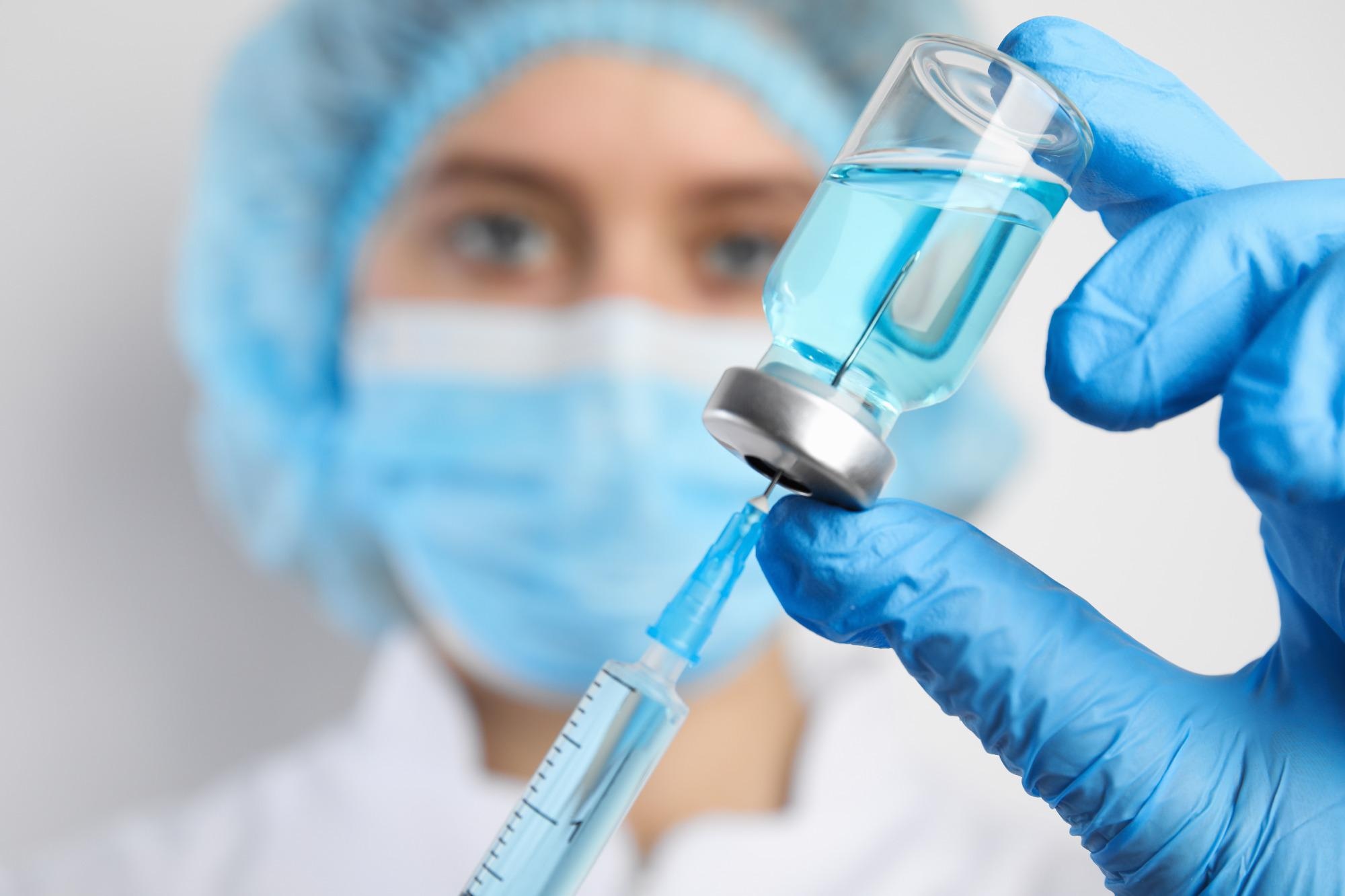Several coronavirus disease 2019 (COVID-19) vaccines require multiple doses for long-lasting immunity. However, a new study published in the journal Biomacromolecules has developed a promising single-dose vaccine platform using an injectable hydrogel containing an epitope-labeled plant virus, Cowpea mosaic virus (CPMV).
 Study: Injectable Slow-Release Hydrogel Formulation of a Plant Virus-Based COVID-19 Vaccine Candidate. Image Credit: New Africa / Shutterstock
Study: Injectable Slow-Release Hydrogel Formulation of a Plant Virus-Based COVID-19 Vaccine Candidate. Image Credit: New Africa / Shutterstock
Two-dose vaccines
Cowpea mosaic virus (CPMV) is a potent candidate for vaccine development. However, following injection, viral particles degrade rapidly in the body. Consequently, multiple doses are needed for long-lasting immunity, which is not ideal for global mass vaccination campaigns. So the researchers at the University of California San Diego formulated CPMV nanoparticles in injectable hydrogels to achieve slow particle release and prolonged immunostimulation.
Hydrogels
Chitosan is a polysaccharide obtained after the deacetylation of chitin. It is biocompatible, nonimmunogenic, and biodegradable. It is considered safe and is approved for products like BST-CarGel for cartilage regeneration. Several studies have shown that chitosan can enhance immune responses when used as a vaccine adjuvant. When mixed with glycerophosphate (GP), chitosan forms a liquid at room temperature that forms a gel at body temperature. These hydrogels are easy to prepare and inject. Chitosan/GP hydrogels have uses in drug delivery, tissue regeneration/repair, and a slow release of nanoparticles.
CPMV in hydrogels
CPMV was isolated from infected black-eyed pea plant leaves. The viral particles were conjugated with cyanine 5 (Cy5), a fluorescent marker. These CPMV particles were dispersed in hydrogels formed by mixing chitosan and GP. Liquid formulations of chitosan and GP were mixed with CPMV particles at room temperature. The gelling behavior of chitosan/GP mixture with CPMV was characterized to identify ideal concentrations. The mixtures containing high-molecular-weight chitosan and 0−4.5 mg/mL CPMV gelled at 37°C in 5−8 minutes and slowly released Cy5-CPMV particles in vitro and in vivo.
The Cy5-CPMV particles slowly released from the hydrogels even though the gels remained stable for 21 days, the testing time period. Thus, the CPMV particles could diffuse through the hydrogel pores. While the liquid formulation released 100% of the particles after 10 days, the hydrogels released only 10–12% of the particles after 21 days. Thus, slow particle release could be achieved through chitosan/GP hydrogels.
The chemically modified CPMV particles maintained their physical integrity after encapsulation within the hydrogels and also after release from the hydrogels.
CPMV in hydrogels as a single-dose vaccine
The CPMV particles were conjugated with a portion of the severe acute respiratory syndrome coronavirus 2 (SARS-CoV-2) spike (S) protein. This selected peptide sequence is B-cell epitope 826. It is highly conserved among SARS-CoV-2 variants. It is not affected by the mutations that generated the Delta and Omicron variants.
The hydrogel containing 826-CPMV particles was injected into mice via a single subcutaneous injection to evaluate its immunogenicity. The mice produced anti-826 antibodies. Compared to the soluble formulation, the hydrogel formulation improved the levels of anti-826 antibodies between weeks 12 and 20 post-injection.
High antibody levels were also observed at week 20 post-injection.
Higher antibody levels were observed in mice injected with hydrogels when compared to mice injected with a single dose or two doses (prime-boost) of the soluble 826-CPMV formulation.
The hydrogel vaccine initially generated a Th1 cell-biased response that shifted to a Th2 cell-biased response. Th1 cell-biased response induces phagocytic activity against intracellular pathogens. Th2 cell-based response induces the production of neutralizing antibodies against pathogens.
Both soluble and hydrogel vaccines induced similar antibody profiles at week 4 post-injection. The differences in antibody profiles were evident at week 12. The hydrogel vaccine-elicited response shifted to Th2-biased at week 12. The soluble vaccines retained the Th1 bias.
The comparative release profiles of soluble particles versus hydrogels have to be studied to determine whether CPMV vaccines inherently elicit a Th1-biased immune response or whether the epitope determines the Th1/2 bias.
Conclusion
CPMV particles can be encapsulated in chitosan/GP hydrogels. They are released as intact particles for several months, eliciting a sustained immune response—the immune response shifts from Th1-biased to Th2-biased profiles. The injectable hydrogel containing epitope-labeled CPMV is a promising candidate as a single-dose vaccine platform. This strategy paves the way for developing long-lasting nanomedicines based on plant viruses.
Implications
Repeat vaccinations have been implemented by many nations in order to ensure sustained immunity and to combat COVID-19.
Due to the slow release of vaccine antigens over several months, slow-release formulations could provide long-lasting immunity. The use of single-dose formulations that last longer will reduce the number of vaccination appointments needed to achieve population-wide coverage. This could reduce the burden placed on global health systems.
Journal reference:
- Nkanga CI, Ortega-Rivera OA, Shin MD, Moreno-Gonzalez MA, Steinmetz NF. (2022). Injectable slow-release hydrogel formulation of a plant virus-based COVID-19 vaccine candidate. Biomacromolecules. 23 (4): 1812-1825. doi:10.1021/acs.biomac.2c00112.